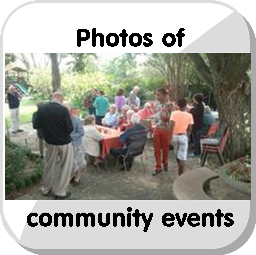|
The Gospel Study during this month began by looking at the difference between what is meant by church, congregation, community and brotherhood. All these terms are used by Paul and other epistle writers and in the Acts of the Apostles and without understanding the Koine Greek these have been mistranslated or misunderstood.
Rev. Michaël Merle introduced four words from New Testament (or koine Greek) that had been illuminated during the Gospel Study the previous Tuesday. The first word being Ekklesia which has changed meaning since it was used in the New Testament. It is now associates the institution of the church – the organisation, hierarchy and sometimes even the building which is the church. When it was used in the New Testament it meant an assembly of those called out; those who feel called out to join an assembly; or a congregation. The second word is koinonia which means a community. A community develops through a culture, common expression and relationships. A congregation or community may feel the need for a sacred space, which in koine Greek was a kiriakon. This became a kirikon which was taken into the Germanic languages as kirke and chirch (ch pronounced as k) and church. This is the space in which we gather – the temple, room or building. Lastly, the word Adelphus who are those sitting in the circle whom one thinks of as brothers and sisters. Thereafter the study looked at the Sunday Gospel Readings, firstly at the story of Nicodemus and then at the encounter of Jesus with the Samaritan woman at the well. In the story of Nicodemus, the first thing worth mentioning is that Jesus says to him that one must be “born from the heights”. There is no mention of being ‘born again’. Jesus is saying to Nicodemus that the essential nature of the human being – our I-constitution – must enter into a renewed etheric body and a renewed astral body for the continuation of the human being. If these are not renewed the I-constitution will enter into the dying reality of earth. This renewal must come from the heights. We can understand that this is something that has occurred for humanity and it is now the task of humanity to work into the astral body and the etheric body with the I-constitution in order to create the continuation of our future. The story of the Samaritan woman is one that deals with worship. The Samaritans are descendants of Jacob but during their history five foreign tribes were placed in the towns that had been given to the Samaritans. They had thereby changed their worship of YHWH (Yahweh of the Elohim) and had also taken to worshipping the gods of the five other tribes. Therefore, when Jesus speaks to the woman he is speaking to her as a representative of the whole Samaritan tribe. When she recognises that Jesus is speaking about worship (Jesus does not simply say, call your husband, but rather call the one who is your Lord) she immediately responds by asking about worship. The Greek grammar of saying “the hour is coming and has indeed come: is now” is quite startling, and it means that this signifies a significant shift for humanity. The woman then goes back into the town and invites everyone to come and meet Jesus and to confirm her assessment. This earned her being ‘baptised’ by the Orthodox Church and recognised as an Apostle. The big shift for humanity is that worship shifts from a specific place out in the world to within every human being.
0 Comments
Leave a Reply. |
Article Archives
December 2022
2023 - January to December
2021 - January to December 2020 - January to December 2019 - January to December 2018 - January to December 2017 - January to December 2016 - January to December 2015 - January to December 2014 - November & December 2013 - July to December 2013 - January to June 2012 - April to December Send us your photos of community events.
Articles (prefaced by month number)
All
|

 RSS Feed
RSS Feed